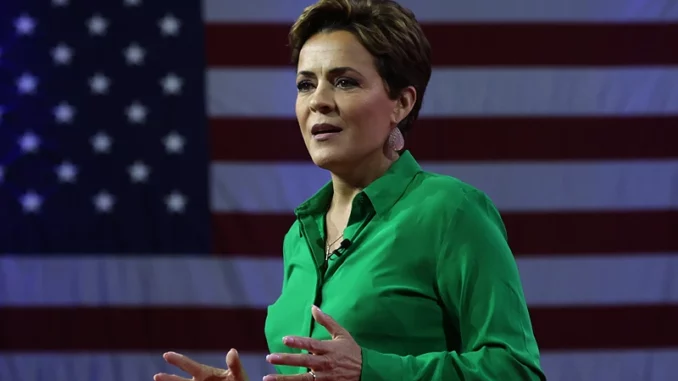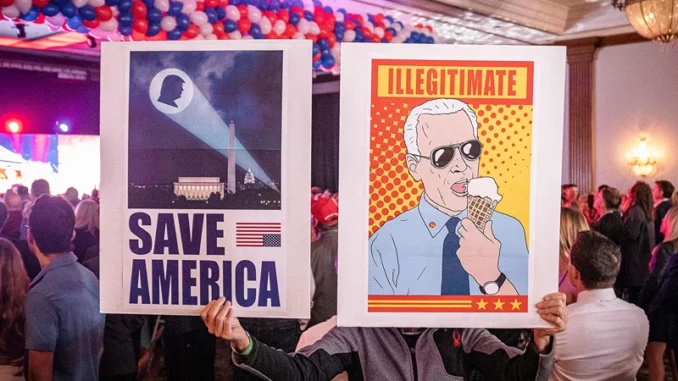T. Belman. I am astounded how difficult it is th the US to win an election fraud case.
Arizona’s highest court has declined to hear Republican gubernatorial candidate Kari Lake’s appeal of her election loss to Katie Hobbs.
The Arizona court kept the issue afloat by referencing one of Lake’s arguments back to a county judge for consideration.
After a Maricopa County judge and state appeals court rejected Lake’s assertions that she was the legitimate governor and that a new election should be held, she petitioned the Arizona Supreme Court to hear her case.
On Wednesday, the Arizona Supreme Court said in a memo that the justices are granting the review of only one of her seven claims.
According to Chief Judge Robert Brutinel’s statement published on Wednesday, the former news anchor filed seven legal claims regarding her case, six of which the state’s highest court determined were correctly rejected by lower courts.
These included allegations that “thousands” of people were denied the right to vote due to issues with the tabulation equipment, and that tens of thousands of votes were “injected” into the election, which Lake called an “undisputed truth” in the lawsuit.
The chief judge’s opinion piece said that Lake’s struggles were “insufficient to warrant the requested relief under Arizona or federal law.”
However, the court mandated that a county judge must take another look at the sixth legal issue, which relates to Lake’s argument that Maricopa County did not follow signature verification protocols.
The county and appeals courts rejected Lake’s claim on the grounds that she filed her legal challenge too late, interpreting her signature-related objection as pertaining to the regulations themselves rather than how the policies were enforced in 2022.
Yet, the Supreme Court noted that this was a mistake, saying “Lake could not have brought this challenge before the election.”
Lake’s allegation cites a provision of Arizona law that establishes the procedure and time frame for validating or “curing” a ballot if the signature doesn’t seem to match. It also mandates that signatures on early ballot envelopes be compared to those already in a voter’s file.
She stated that last year the office of Maricopa County Registrar Stephen Richer accepted “a considerable number” of votes with mismatched signatures.
The Supreme Court solely considered the legal arguments put forward by earlier courts rather than considering the merits of Lake’s claim. In accordance with the court’s order, Maricopa County Superior Court Judge Peter Thompson must reexamine that single aspect of Lake’s claim to determine whether the claim was rightfully rejected in the past or if Lake can demonstrate that “votes (were) affected in sufficient numbers to alter the outcome of the election.”
According to the appeals court ruling, Lake must provide a “competent mathematical basis to conclude that the outcome would plausibly have been different, not simply an untethered assertion of uncertainty.”
“We’ll now proceed and win, again, for approximately the 30th time. I of course have the utmost regard for both the persons sitting on the court and the court as an institution,” said Maricopa Country Reporter Stephen Richer (R-Ariz.).
In multiple lawsuits related to the November election, his office and the Maricopa County Board of Supervisors have defended their work. As a result, they have come under fire from defeated Republican candidates and their loyal supporters.
Governor Katie Hobbs (D-Ariz.), who is a defendant in the lawsuit, remained silent about the court’s decision.
Lake’s spokesperson, Alex Nicoll, similarly declined to respond, pointing out that Lake has routinely refused to talk to The Arizona Republic.
Some say that Lake misrepresented the court’s decision by making a number of unsubstantiated assertions in a separate statement that was distributed to The Republic and other media sources.
<
>
<
>
The signature issue, she claimed, “alone casts the veracity of Katie Hobb’s victory in serious doubt.”
Another outstanding matter in the case, in addition to further assessment of the signature verification component, is whether Lake should be punished for bringing what Hobbs’ lawyers have described as a frivolous and bad-faith complaint.
Hobbs’ attorneys urged the court to force Lake to pay their costs and fees, and the attorneys for Secretary of State Adrian Fontes (D-Ariz.) requested a variety of undefined sanctions.
The Supreme Court ruled that Lake, Hobbs, and Fontes were permitted to present legal arguments on the matter. However, only arguments supporting Lake’s factual assertions, such as the notion that more than 35,000 ballots were “added” to the election in order to influence the results.
“The record does not reflect that 35,563 unaccounted ballots were added to the total count… The motions for sanctions will be considered in due course,” Brutinel said, dismissing the claim.
Since Lake’s defeat in November, her political future has remained uncertain, and she has stated that she wants to conclude her court appeals before declaring her next move.
However, since Lake gave a keynote speech earlier this month at the Conservative Political Action Conference (CPAC), and also criticized Senate candidate Ruben Gallego (D-Ariz.) over a story in The Arizona Republic, she has fueled rumors regarding a prospective 2024 bid.
The Republic published information on Gallego’s prior engagement in a dubious business endeavor to provide loans to Latino neighborhoods, possibly for his own financial gain.
“Just another corrupt politician looking to line his own pockets… I believe Arizonans are ready for a new generation of citizen leaders who are ready to work for the people,” Lake said concerning Gallego.
https://s3.documentcloud.org/documents/23720623/orderrepetitionforreview-4731530-0.pdf





The ruling from the AZ Supreme Court was significant, and not in the way in which most outlets are reporting it. This case will succeed or fail at the SCOTUS level, this was always true and remains so now. That being said, the referral back to the lower court to consider the issue of the ballot signatures on the mail in ballots is an enormous victory. The easiest, most quantifiable test of the AZ fraud was and remains the signature matches. The election was very close. All Lake has to do is to demonstrate that the number of signatures that do not match are greater than the lead by which Hobbs won the election. The election results show Hobbs with a final lead of only 17K votes. To explain this more carefully, Lake needs to demonstrate that the ballots chosen for signature analysis (it is only a sample of the total ballots cast) have enough mismatched signatures such that it would mathmatically result in a total number of ballots being more than the 17K ballot election lead with which Hobbs won. Based on what has been stated by Lake’s team, this should be possible. This was always the strongest, easiest, most objective evidence demonstrating the fraudulent result in this election, albeit it is only part of the fraud which took place that day and all the other components have been ignored by the AZ Supreme Court. Nonetheless, as noted above, this will all be decided by the SCOTUS – that’s both the good news and the bad news, of course.